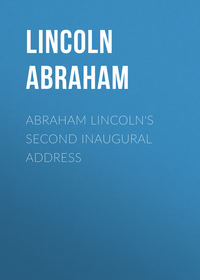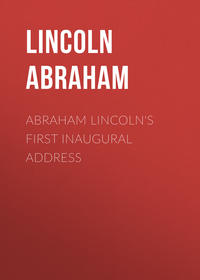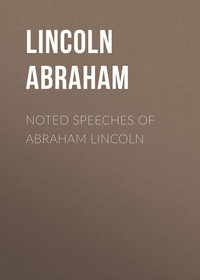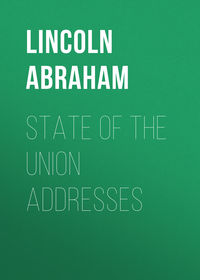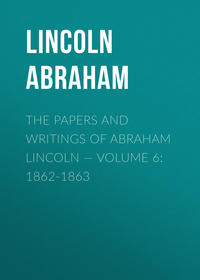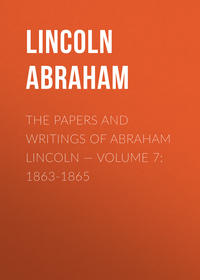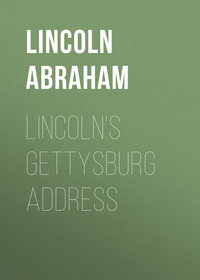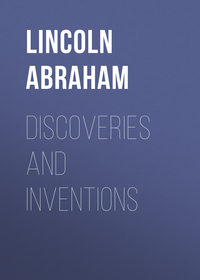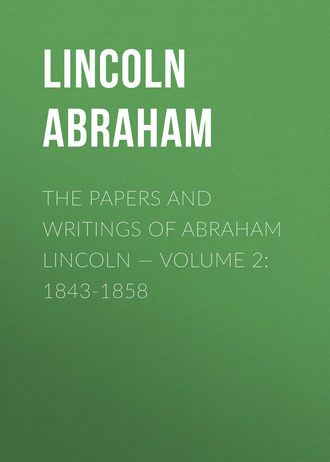 полная версия
полная версияThe Papers And Writings Of Abraham Lincoln — Volume 2: 1843-1858
One word more, and I shall have done with this branch of the subject. You Democrats, and your candidate, in the main are in favor of laying down in advance a platform — a set of party positions — as a unit, and then of forcing the people, by every sort of appliance, to ratify them, however unpalatable some of them may be. We and our candidate are in favor of making Presidential elections and the legislation of the country distinct matters; so that the people can elect whom they please, and afterward legislate just as they please, without any hindrance, save only so much as may guard against infractions of the Constitution, undue haste, and want of consideration. The difference between us is clear as noonday. That we are right we cannot doubt. We hold the true Republican position. In leaving the people's business in their hands, we cannot be wrong. We are willing, and even anxious, to go to the people on this issue.
But I suppose I cannot reasonably hope to convince you that we have any principles. The most I can expect is to assure you that we think we have and are quite contented with them. The other day one of the gentlemen from Georgia [Mr. Iverson], an eloquent man, and a man of learning, so far as I can judge, not being learned myself, came down upon us astonishingly. He spoke in what the 'Baltimore American' calls the "scathing and withering style." At the end of his second severe flash I was struck blind, and found myself feeling with my fingers for an assurance of my continued existence. A little of the bone was left, and I gradually revived. He eulogized Mr. Clay in high and beautiful terms, and then declared that we had deserted all our principles, and had turned Henry Clay out, like an old horse, to root. This is terribly severe. It cannot be answered by argument — at least I cannot so answer it. I merely wish to ask the gentleman if the Whigs are the only party he can think of who sometimes turn old horses out to root. Is not a certain Martin Van Buren an old horse which your own party have turned out to root? and is he not rooting a little to your discomfort about now? But in not nominating Mr. Clay we deserted our principles, you say. Ah! In what? Tell us, ye men of principle, what principle we violated. We say you did violate principle in discarding Van Buren, and we can tell you how. You violated the primary, the cardinal, the one great living principle of all democratic representative government — the principle that the representative is bound to carry out the known will of his constituents. A large majority of the Baltimore convention of 1844 were, by their constituents, instructed to procure Van Buren 's nomination if they could. In violation — in utter glaring contempt of this, you rejected him; rejected him, as the gentleman from New York [Mr. Birdsall] the other day expressly admitted, for availability — that same "general availability" which you charge upon us, and daily chew over here, as something exceedingly odious and unprincipled. But the gentleman from Georgia [Mr. Iverson] gave us a second speech yesterday, all well considered and put down in writing, in which Van Buren was scathed and withered a "few" for his present position and movements. I cannot remember the gentleman's precise language; but I do remember he put Van Buren down, down, till he got him where he was finally to "stink" and "rot."
Mr. Speaker, it is no business or inclination of mine to defend Martin Van Buren in the war of extermination now waging between him and his old admirers. I say, "Devil take the hindmost" — and the foremost. But there is no mistaking the origin of the breach; and if the curse of "stinking" and "rotting" is to fall on the first and greatest violators of principle in the matter, I disinterestedly suggest that the gentleman from Georgia and his present co-workers are bound to take it upon themselves. But the gentleman from Georgia further says we have deserted all our principles, and taken shelter under General Taylor's military coat-tail, and he seems to think this is exceedingly degrading. Well, as his faith is, so be it unto him. But can he remember no other military coat-tail under which a certain other party have been sheltering for near a quarter of a century? Has he no acquaintance with the ample military coat tail of General Jackson? Does he not know that his own party have run the five last Presidential races under that coat-tail, and that they are now running the sixth under the same cover? Yes, sir, that coat-tail was used not only for General Jackson himself, but has been clung to, with the grip of death, by every Democratic candidate since. You have never ventured, and dare not now venture, from under it. Your campaign papers have constantly been "Old Hickories," with rude likenesses of the old general upon them; hickory poles and hickory brooms your never-ending emblems; Mr. Polk himself was "Young Hickory," or something so; and even now your campaign paper here is proclaiming that Cass and Butler are of the true "Hickory stripe." Now, sir, you dare not give it up. Like a horde of hungry ticks you have stuck to the tail of the Hermitage Lion to the end of his life; and you are still sticking to it, and drawing a loathsome sustenance from it, after he is dead. A fellow once advertised that he had made a discovery by which he could make a new man out of an old one, and have enough of the stuff left to make a little yellow dog. Just such a discovery has General Jackson's popularity been to you. You not only twice made President of him out of it, but you have had enough of the stuff left to make Presidents of several comparatively small men since; and it is your chief reliance now to make still another.
Mr. Speaker, old horses and military coat-tails, or tails of any sort, are not figures of speech such as I would be the first to introduce into discussions here; but as the gentleman from Georgia has thought fit to introduce them, he and you are welcome to all you have made, or can make by them. If you have any more old horses, trot them out; any more tails, just cock them and come at us. I repeat, I would not introduce this mode of discussion here; but I wish gentlemen on the other side to understand that the use of degrading figures is a game at which they may not find themselves able to take all the winnings.
["We give it up!"]
Aye, you give it up, and well you may; but for a very different reason from that which you would have us understand. The point — the power to hurt — of all figures consists in the truthfulness of their application; and, understanding this, you may well give it up. They are weapons which hit you, but miss us.
But in my hurry I was very near closing this subject of military tails before I was done with it. There is one entire article of the sort I have not discussed yet, — I mean the military tail you Democrats are now engaged in dovetailing into the great Michigander [Cass]. Yes, sir; all his biographies (and they are legion) have him in hand, tying him to a military tail, like so many mischievous boys tying a dog to a bladder of beans. True, the material they have is very limited, but they drive at it might and main. He invaded Canada without resistance, and he outvaded it without pursuit. As he did both under orders, I suppose there was to him neither credit nor discredit in them; but they constitute a large part of the tail. He was not at Hull's surrender, but he was close by; he was volunteer aid to General Harrison on the day of the battle of the Thames; and as you said in 1840 Harrison was picking huckleberries two miles off while the battle was fought, I suppose it is a just conclusion with you to say Cass was aiding Harrison to pick huckleberries. This is about all, except the mooted question of the broken sword. Some authors say he broke it, some say he threw it away, and some others, who ought to know, say nothing about it. Perhaps it would be a fair historical compromise to say, if he did not break it, he did not do anything else with it.
By the way, Mr. Speaker, did you know I am a military hero? Yes, sir; in the days of the Black Hawk war I fought, bled, and came away. Speaking of General Cass's career reminds me of my own. I was not at Stiliman's defeat, but I was about as near it as Cass was to Hull's surrender; and, like him, I saw the place very soon afterward. It is quite certain I did not break my sword, for I had none to break; but I bent a musket pretty badly on one occasion. If Cass broke his sword, the idea is he broke it in desperation; I bent the musket by accident. If General Cass went in advance of me in picking huckleberries, I guess I surpassed him in charges upon the wild onions. If he saw any live, fighting Indians, it was more than I did; but I had a good many bloody struggles with the mosquitoes, and although I never fainted from the loss of blood, I can truly say I was often very hungry. Mr. Speaker, if I should ever conclude to doff whatever our Democratic friends may suppose there is of black-cockade federalism about me, and therefore they shall take me up as their candidate for the Presidency, I protest they shall not make fun of me, as they have of General Cass, by attempting to write me into a military hero.
While I have General Cass in hand, I wish to say a word about his political principles. As a specimen, I take the record of his progress in the Wilmot Proviso. In the Washington Union of March 2, 1847, there is a report of a speech of General Cass, made the day before in the Senate, on the Wilmot Proviso, during the delivery of which Mr. Miller of New Jersey is reported to have interrupted him as follows, to wit:
"Mr. Miller expressed his great surprise at the change in the sentiments of the Senator from Michigan, who had been regarded as the great champion of freedom in the Northwest, of which he was a distinguished ornament. Last year the Senator from Michigan was understood to be decidedly in favor of the Wilmot Proviso; and as no reason had been stated for the change, he [Mr. Miller] could not refrain from the expression of his extreme surprise."
To this General Cass is reported to have replied as follows, to wit:
"Mr. Cass said that the course of the Senator from New Jersey was most extraordinary. Last year he [Mr. Cass] should have voted for the proposition, had it come up. But circumstances had altogether changed. The honorable Senator then read several passages from the remarks, as given above, which he had committed to writing, in order to refute such a charge as that of the Senator from New Jersey."
In the "remarks above reduced to writing" is one numbered four, as follows, to wit:
"Fourth. Legislation now would be wholly inoperative, because no territory hereafter to be acquired can be governed without an act of Congress providing for its government; and such an act, on its passage, would open the whole subject, and leave the Congress called on to pass it free to exercise its own discretion, entirely uncontrolled by any declaration found on the statute-book."
In Niles's Register, vol. lxxiii., p. 293, there is a letter of General Cass to — Nicholson, of Nashville, Tennessee, dated December 24, 1847, from which the following are correct extracts:
"The Wilmot Proviso has been before the country some time. It has been repeatedly discussed in Congress and by the public press. I am strongly impressed with the opinion that a great change has been going on in the public mind upon this subject, — in my own as well as others', — and that doubts are resolving themselves into convictions that the principle it involves should be kept out of the national legislature, and left to the people of the confederacy in their respective local governments... Briefly, then, I am opposed to the exercise of any jurisdiction by Congress over this matter; and I am in favor of leaving the people of any territory which may be hereafter acquired the right to regulate it themselves, under the general principles of the Constitution. Because — 'First. I do not see in the Constitution any grant of the requisite power to Congress; and I am not disposed to extend a doubtful precedent beyond its necessity, — the establishment of territorial governments when needed, — leaving to the inhabitants all the right compatible with the relations they bear to the confederation."
These extracts show that in 1846 General Cass was for the proviso at once; that in March, 1847, he was still for it, but not just then; and that in December, 1847, he was against it altogether. This is a true index to the whole man. When the question was raised in 1846, he was in a blustering hurry to take ground for it. He sought to be in advance, and to avoid the uninteresting position of a mere follower; but soon he began to see glimpses of the great Democratic ox-goad waving in his face, and to hear indistinctly a voice saying, "Back! Back, sir! Back a little!" He shakes his head, and bats his eyes, and blunders back to his position of March, 1847; but still the goad waves, and the voice grows more distinct and sharper still, "Back, sir! Back, I say! Further back!" — and back he goes to the position of December, 1847, at which the goad is still, and the voice soothingly says, "So! Stand at that!"
Have no fears, gentlemen, of your candidate. He exactly suits you, and we congratulate you upon it. However much you may be distressed about our candidate, you have all cause to be contented and happy with your own. If elected, he may not maintain all or even any of his positions previously taken; but he will be sure to do whatever the party exigency for the time being may require; and that is precisely what you want. He and Van Buren are the same "manner of men"; and, like Van Buren, he will never desert you till you first desert him.
Mr. Speaker, I adopt the suggestion of a friend, that General Cass is a general of splendidly successful charges — charges, to be sure, not upon the public enemy, but upon the public treasury. He was Governor of Michigan territory, and ex-officio Superintendent of Indian Affairs, from the 9th of October, 1813, till the 31st of July, 1831 — a period of seventeen years, nine months, and twenty-two days. During this period he received from the United States treasury, for personal services and personal expenses, the aggregate sum of ninety-six thousand and twenty eight dollars, being an average of fourteen dollars and seventy-nine cents per day for every day of the time. This large sum was reached by assuming that he was doing service at several different places, and in several different capacities in the same place, all at the same time. By a correct analysis of his accounts during that period, the following propositions may be deduced:
First. He was paid in three different capacities during the whole of the time: that is to say — (1) As governor a salary at the rate per year of $2000. (2) As estimated for office rent, clerk hire, fuel, etc., in superintendence of Indian affairs in Michigan, at the rate per year of $1500. (3) As compensation and expenses for various miscellaneous items of Indian service out of Michigan, an average per year of $625.
Second. During part of the time — that is, from the 9th of October, 1813, to the 29th of May, 1822 he was paid in four different capacities; that is to say, the three as above, and, in addition thereto, the commutation of ten rations per day, amounting per year to $730.
Third. During another part of the time — that is, from the beginning of 1822 to the 31st of July, '83 he was also paid in four different capacities; that is to say, the first three, as above (the rations being dropped after the 29th of May, 1822), and, in addition thereto, for superintending Indian Agencies at Piqua, Ohio; Fort Wayne, Indiana; and Chicago, Illinois, at the rate per year of $1500. It should be observed here that the last item, commencing at the beginning of 1822, and the item of rations, ending on the 29th of May, 1822, lap on each other during so much of the time as lies between those two dates.
Fourth. Still another part of the time — that is, from the 31st of October, 1821, to the 29th of May, 1822 — he was paid in six different capacities; that is to say, the three first, as above; the item of rations, as above; and, in addition thereto, another item of ten rations per day while at Washington settling his accounts, being at the rate per year of $730; and also an allowance for expenses traveling to and from Washington, and while there, of $1022, being at the rate per year of $1793.
Fifth. And yet during the little portion of the time which lies between the 1st of January, 1822, and the 29th of May, 1822, he was paid in seven different capacities; that is to say, the six last mentioned, and also, at the rate of $1500 per year, for the Piqua, Fort Wayne, and Chicago service, as mentioned above.
These accounts have already been discussed some here; but when we are amongst them, as when we are in the Patent Office, we must peep about a good deal before we can see all the curiosities. I shall not be tedious with them. As to the large item of $1500 per year — amounting in the aggregate to $26,715 for office rent, clerk hire, fuel, etc., I barely wish to remark that, so far as I can discover in the public documents, there is no evidence, by word or inference, either from any disinterested witness or of General Cass himself, that he ever rented or kept a separate office, ever hired or kept a clerk, or even used any extra amount of fuel, etc., in consequence of his Indian services. Indeed, General Cass's entire silence in regard to these items, in his two long letters urging his claims upon the government, is, to my mind, almost conclusive that no such claims had any real existence.
But I have introduced General Cass's accounts here chiefly to show the wonderful physical capacities of the man. They show that he not only did the labor of several men at the same time, but that he often did it at several places, many hundreds of miles apart, at the same time. And at eating, too, his capacities are shown to be quite as wonderful. From October, 1821, to May, 1822, he eat ten rations a day in Michigan, ten rations a day here in Washington, and near five dollars' worth a day on the road between the two places! And then there is an important discovery in his example — the art of being paid for what one eats, instead of having to pay for it. Hereafter if any nice young man should owe a bill which he cannot pay in any other way, he can just board it out. Mr. Speaker, we have all heard of the animal standing in doubt between two stacks of hay and starving to death. The like of that would never happen to General Cass. Place the stacks a thousand miles apart, he would stand stock-still midway between them, and eat them both at once, and the green grass along the line would be apt to suffer some, too, at the same time. By all means make him President, gentlemen. He will feed you bounteously — if — if there is any left after he shall have helped himself.
But, as General Taylor is, par excellence, the hero of the Mexican War, and as you Democrats say we Whigs have always opposed the war, you think it must be very awkward and embarrassing for us to go for General Taylor. The declaration that we have always opposed the war is true or false, according as one may understand the term "oppose the war." If to say "the war was unnecessarily and unconstitutionally commenced by the President" by opposing the war, then the Whigs have very generally opposed it. Whenever they have spoken at all, they have said this; and they have said it on what has appeared good reason to them. The marching an army into the midst of a peaceful Mexican settlement, frightening the inhabitants away, leaving their growing crops and other property to destruction, to you may appear a perfectly amiable, peaceful, unprovoking procedure; but it does not appear so to us. So to call such an act, to us appears no other than a naked, impudent absurdity, and we speak of it accordingly. But if, when the war had begun, and had become the cause of the country, the giving of our money and our blood, in common with yours, was support of the war, then it is not true that we have always opposed the war. With few individual exceptions, you have constantly had our votes here for all the necessary supplies. And, more than this, you have had the services, the blood, and the lives of our political brethren in every trial and on every field. The beardless boy and the mature man, the humble and the distinguished — you have had them. Through suffering and death, by disease and in battle they have endured and fought and fell with you. Clay and Webster each gave a son, never to be returned. From the State of my own residence, besides other worthy but less known Whig names, we sent Marshall, Morrison, Baker, and Hardin; they all fought, and one fell, and in the fall of that one we lost our best Whig man. Nor were the Whigs few in number, or laggard in the day of danger. In that fearful, bloody, breathless struggle at Buena Vista, where each man's hard task was to beat back five foes or die himself, of the five high officers who perished, four were Whigs.
In speaking of this, I mean no odious comparison between the lion-hearted Whigs and the Democrats who fought there. On other occasions, and among the lower officers and privates on that occasion, I doubt not the proportion was different. I wish to do justice to all. I think of all those brave men as Americans, in whose proud fame, as an American, I too have a share. Many of them, Whigs and Democrats are my constituents and personal friends; and I thank them, — more than thank them, — one and all, for the high imperishable honor they have conferred on our common State.
But the distinction between the cause of the President in beginning the war, and the cause of the country after it was begun, is a distinction which you cannot perceive. To you the President and the country seem to be all one. You are interested to see no distinction between them; and I venture to suggest that probably your interest blinds you a little. We see the distinction, as we think, clearly enough; and our friends who have fought in the war have no difficulty in seeing it also. What those who have fallen would say, were they alive and here, of course we can never know; but with those who have returned there is no difficulty. Colonel Haskell and Major Gaines, members here, both fought in the war, and both of them underwent extraordinary perils and hardships; still they, like all other Whigs here, vote, on the record, that the war was unnecessarily and unconstitutionally commenced by the President. And even General Taylor himself, the noblest Roman of them all, has declared that as a citizen, and particularly as a soldier, it is sufficient for him to know that his country is at war with a foreign nation, to do all in his power to bring it to a speedy and honorable termination by the most vigorous and energetic operations, without inquiry about its justice, or anything else connected with it.
Mr. Speaker, let our Democratic friends be comforted with the assurance that we are content with our position, content with our company, and content with our candidate; and that although they, in their generous sympathy, think we ought to be miserable, we really are not, and that they may dismiss the great anxiety they have on our account.
Mr. Speaker, I see I have but three minutes left, and this forces me to throw out one whole branch of my subject. A single word on still another. The Democrats are keen enough to frequently remind us that we have some dissensions in our ranks. Our good friend from Baltimore immediately before me [Mr. McLane] expressed some doubt the other day as to which branch of our party General Taylor would ultimately fall into the hands of. That was a new idea to me. I knew we had dissenters, but I did not know they were trying to get our candidate away from us. I would like to say a word to our dissenters, but I have not the time. Some such we certainly have; have you none, gentlemen Democrats? Is it all union and harmony in your ranks? no bickerings? no divisions? If there be doubt as to which of our divisions will get our candidate, is there no doubt as to which of your candidates will get your party? I have heard some things from New York; and if they are true, one might well say of your party there, as a drunken fellow once said when he heard the reading of an indictment for hog-stealing. The clerk read on till he got to and through the words, "did steal, take, and carry away ten boars, ten sows, ten shoats, and ten pigs," at which he exclaimed, "Well, by golly, that is the most equally divided gang of hogs I ever did hear of!" If there is any other gang of hogs more equally divided than the Democrats of New York are about this time, I have not heard of it.


